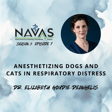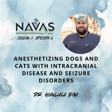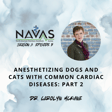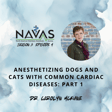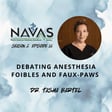
Dr. Luiz Santos Guides Us Through Second Victim Syndrome
Here at NAVAS we spend a lot of time educating veterinary professionals on safe anesthetic practices, but what about the safety of the anesthetist? In today’s episode, we are going to explore a mental health phenomenon known as second victim syndrome. Second victims are health care providers who are involved in an unanticipated adverse patient event, in a medical error, or in a patient-related injury and begin to feel personally responsible for the patient outcome, causing the provider to become traumatized by the event. As a result, veterinary professionals experience a tremendous amount of professional and personal suffering following these unanticipated clinical events. Anesthesia is a high-stakes field driven almost entirely by human decision making, and it is not surprising that errors, complications, or unexpected outcomes, although unintended, will occur and the patient may suffer. This makes anesthetists vulnerable to the second victim syndrome when medical errors occur. How can we help support ourselves and our peers following an adverse patient event and how can we learn to thrive after experiencing such a traumatic event? To help guide us through this important, but difficult topic, is Dr. Luiz Santos. He is a Senior Clinician of Veterinary Anesthesia at the University of Glasgow and he is currently obtaining his PhD in topics related to patient safety culture, burnout, and second victim syndrome as they relate to veterinary anesthetic practice.
Dr. Santos will be one of the featured speakers at our NAVAS Virtual Spring Symposium on April 27th and 28th, 2024. Registration is free!
As a warning, there will be mention of mass casualty events and suicide in this episode. Timestamps for these discuss are as follows:
Discussion on gun violence/mass casualty event: 16:30-17:30
Mention of suicide: 46:15-47:26
Resources mentioned in today’s episode:
Dr. Hoffmeister’s and Dr. Love’s JAVMA article on patient safety culture in veterinary medicine
Dr. Ludder’s book on medical errors in veterinary anesthetic practice
The Second Victim Experience: Caring for our Own a presentation by Dr. Susan Scott
If you or someone you know is experiencing trauma related to second victim syndrome, please reach out to the US National Suicide Hotline (or dial or text 988).
If you like what you hear, we have a couple of favors to ask of you:
Become a member of NAVAS for access to more anesthesia and analgesia educational and RACE-approved CE content.
Spread the word. Share our podcast on your socials or a discussion forum. That would really help us achieve our mission: Reduce mortality and morbidity in veterinary patients undergoing sedation, anesthesia, and analgesia through high-quality, peer-reviewed education.
Thank you to our sponsor, Dechra - learn more about the pharmaceutical products Dechra has to offer veterinary professionals, such as Zenalpha.
If you have questions about this episode or want to suggest topics for future episodes, reach out to the producers at education@mynavas.org.
All opinions stated by the host and their guests are theirs alone and do not represent the thoughts or opinions of any corporation, university, or other business or governmental entity.
The NAVAS Podcast is published monthly on or near the 15th of the month.
Special thanks to Chris Webster for editing, producer Maria Bridges, and Saul Jimenez for IT support in making this podcast a reality.
